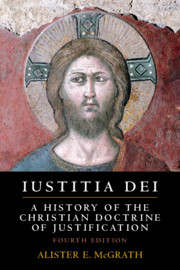Book contents
- Iustitia Dei
- Iustitia Dei
- Copyright page
- Contents
- Tables
- Preface to the Fourth Edition
- Abbreviations
- Introduction
- Part I Justification
- Part II The Middle Ages
- 4 The Nature of Justification
- 5 The Righteousness of God
- 6 The Concept of Grace
- 7 The Human Appropriation of Justification
- 8 Justification and the Two Powers of God
- 9 The Concept of Merit
- 10 Justification and the Sacraments
- Part III Protestantism
- Part IV Catholicism
- Part V The Modern Period
- Conclusion
- A Brief Glossary of Medieval Soteriological Terms
- Works Consulted
- Index
8 - Justification and the Two Powers of God
from Part II - The Middle Ages
Published online by Cambridge University Press: 27 January 2020
- Iustitia Dei
- Iustitia Dei
- Copyright page
- Contents
- Tables
- Preface to the Fourth Edition
- Abbreviations
- Introduction
- Part I Justification
- Part II The Middle Ages
- 4 The Nature of Justification
- 5 The Righteousness of God
- 6 The Concept of Grace
- 7 The Human Appropriation of Justification
- 8 Justification and the Two Powers of God
- 9 The Concept of Merit
- 10 Justification and the Sacraments
- Part III Protestantism
- Part IV Catholicism
- Part V The Modern Period
- Conclusion
- A Brief Glossary of Medieval Soteriological Terms
- Works Consulted
- Index
Summary
This chapter deals with the question of how the established order of salvation, expressed in terms of the processus iustificationis, can be reliable without in some sense being necessary – and hence violating the divine freedom. This debate became increasingly important in late thirteenth-century theology, and was generally framed in terms of a dialectic between the ‘two powers’ of God. God’s ordained power designated the realm of the actual which, though reliable and grounded in God’s promises, was contingent. God’s absolute power referred to a world of possibilities which subverted the established order of salvation – such as God’s ability to accept someone without a created habit of grace. The chapter opens by considering how medieval theology used the notion of God’s ordained power (potentia ordinata) to explore the self-limitation of God, simultaneously establishing the provisionality and reliability of the established order of salvation. It then moves on to consider criticisms of the logical necessity of certain aspects of this established order, particularly those developed by Duns Scotus, William of Ockham, and representatives of the via moderna,such as Gabriel Biel.
Keywords
- Type
- Chapter
- Information
- Iustitia DeiA History of the Christian Doctrine of Justification, pp. 146 - 155Publisher: Cambridge University PressPrint publication year: 2020

